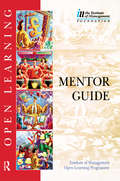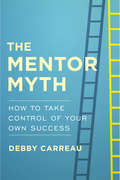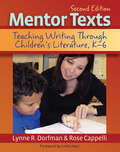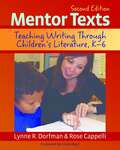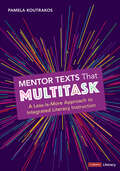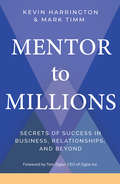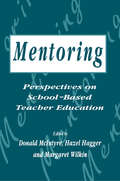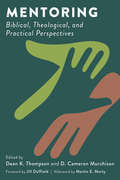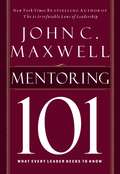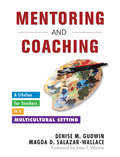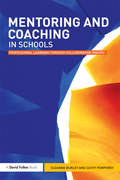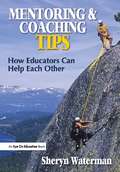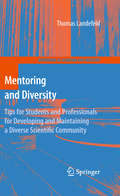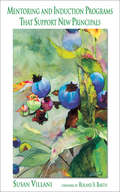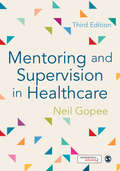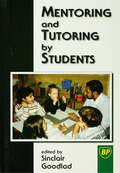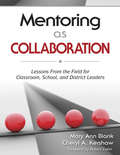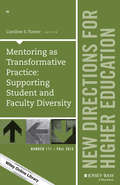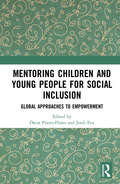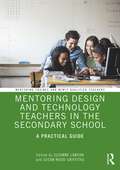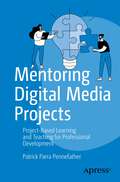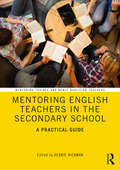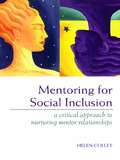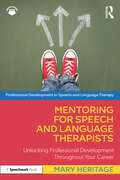- Table View
- List View
Mentor Guide
by Jeremy Kourdi Gareth LewisThe structure of the programme:There are two main guiding principles for the way in which the programme is organized:Firstly, the workbooks are grouped according to the Key Roles of Management.There are two core modules which focus on the personal skills required by all managers to help underwrite competence in all areas.Manage Activities describes the principles of managing the processes and activities of any organisation in its efforts to satisfy the needs of their customers.Manage Resources looks at the acquisition, control and monitoring of financial and other resources.Manage People looks at the principles of leadership, managing performance and developing people.Manage Information looks at the acquisition, storage and use of information for communication, problem solving and decision making.Together, these key roles provide a comprehensive description of the fundamental principles of management as it applies in all organisations.Secondly, the workbooks are grouped according to levels of management. The series is organised on two levels - representing different levels of management seniority and responsibility.Level 4 represents first line management. In accredited programmes this is equivalent to N/SVQ level 4, Certificate in Management or CMS. Level 5 is equivalent to middle/senior management and is accredited at N/SVQ level 5, Diploma in Management or DMS.Finally, the programme covers all of the knowledge and principles in respect of all units of competence in the MCI standards at levels 4 and level 5. These links are shown in the maps provided in the User Guide. The Programme is designed to satisfy the requirements of awarding bodies for qualifications in management at both levels.
The Mentor Myth: How to Take Control of Your Own Success
by Debby CarreauMentors are over-utilized, under-trained and, as studies show, under-deliver. From an employer's perspective, assigning a mentor is often a band-aid to a larger problem. From an employee's perspective, a lack of formal mentorship is seen as a serious, career-inhibiting problem, the equivalent of sailing a boat without a rudder. In The Mentor Myth, Debby Carreau represents this dichotomy, explaining that while a mentor's counsel can be invaluable, it is not the silver bullet human resources professionals often purport it to be. The opinions of a mentor are one data point, one piece in the much more complex game of navigating a career. In fact, the increasing overreliance on mentorship can actually be a hindrance to a successful career. Instead of continually looking outward for career guidance, aspiring professionals must realize that they possess all the tools necessary to take control of their own careers by using their own strengths, capabilities, and visions of success. Through her years of experience consulting, speaking, and writing about career development, Debby has created a comprehensive, easy-to-implement guide for taking ownership of your professional success. Debby begins by helping the reader create a professional roadmap, including how to build a personal brand, project the right amount of confidence, and manage time. She addresses mentors in the context of networks and sponsors, advising the reader how to incorporate outward influences rather than be defined by them.
Mentor Texts: Teaching Writing Through Children's Literature, K-6
by Rose CappelliIn their first edition of Mentor Texts, authors Lynne Dorfman and Rose Cappelli helped teachers across the country make the most of high-quality children's literature in their writing instruction. Mentor Texts: Teaching Writing Through Children's Literature, K-6, 2nd Edition the authors continue to show teachers how to help students become confident, accomplished writers by using literature as their foundation. The second edition includes brand-new Your Turn Lessons, built around the gradual release of responsibility model, offering suggestions for demonstrations and shared or guided writing. Reflection is emphasized as a necessary component to understanding why mentor authors chose certain strategies, literary devices, sentence structures, and words. Dorfman and Cappelli offer new children's book titles in each chapter and in a carefully curated and annotated Treasure Chest. At the end of each chapter a Think About It'sTalk About It'sWrite About It section invites reflection and conversation with colleagues.The book is organized around the characteristics of good writing'sfocus, content, organization, style, and conventions. The authors write in a friendly and conversational style, employing numerous anecdotes to help teachers visualize the process, and offer strategies that can be immediately implemented in the classroom. This practical resource demonstrates the power of learning to read like writers.
Mentor Texts: Teaching Writing Through Children's Literature K-6
by Lynne R. Dorfman Rose CappelliIn the second edition of this important book Lynne and Rose show teachers how to help students become confident, accomplished writers by using literature as their foundation. The second edition includes brand-new “Your Turn Lessons,” built around the gradual release of responsibility model, offering suggestions for demonstrations and shared or guided writing. <p><p> Reflection is emphasized as a necessary component to understanding why mentor authors chose certain strategies, literary devices, sentence structures, and words. The authors offer new children’s book titles in each chapter and in a carefully curated and annotated Treasure Chest. At the end of each chapter a “Think About It―Talk About It―Write About It” section invites reflection and conversation with colleagues. <p><p> The book is organized around the characteristics of good writing―focus, content, organization, style, and conventions. Rose and Lynne write in a friendly and conversational style, employing numerous anecdotes to help teachers visualize the process, and offer strategies that can be immediately implemented in the classroom. This practical resource demonstrates the power of learning to read like writers.
Mentor Texts That Multitask [Grades K-8]: A Less-Is-More Approach to Integrated Literacy Instruction (Corwin Literacy)
by Pamela A. KoutrakosStreamline literacy learning with power-packed children’s books Two of the most common challenges educators face is lack of time and resources. In Mentor Texts That Multitask, Pam Koutrakos shows how to streamline literacy instruction by using a single mentor text to teach reading, writing, spelling, vocabulary, grammar, speaking, and listening. When you integrate literacy instruction this way, concepts start to come together more clearly for children – and teachers save time and expense. This user-friendly resource is packed with ready-to-go lessons and tools to create, plan, and teach using multitasking texts. The lessons and accompanying ideas can jumpstart learning in the classroom by integrating and connecting literacy concepts in time-efficient ways. Resources include Full lessons centered on high-quality children’s literature to take the guesswork out of planning A DIY section to help teachers plan and teach lessons around other favorite texts Dozens of student and classroom examples to show you what’s possible Printables available online to help with immediate implementation. Designed to help teachers build a more inclusive classroom library and instructional practice, this guide highlights texts that represent and celebrate a multitude of characters and topics.
Mentor to Millions: Secrets of Success in Business, Relationships, and Beyond
by Kevin Harrington Mark TimmKevin Harrington, one of the original "sharks" of the TV hit Shark Tank, and serial entrepreneur Mark Timm take you on a journey that radically redefines what it means to truly succeed--at work, at home, and in every area of life.On one of the best days of his life as an entrepreneur, Mark Timm found himself sitting in his car at the end of his driveway. In just a minute he would go into the house and greet his wife and children. But as he basked in the success he'd just had, he also had to face a surprising realization: he didn't really want to go home. Mark knew that once he stepped into the happy chaos of his family, the euphoria of the day would evaporate. His work life and his home life might as well have been two different worlds. And at that moment, he acknowledged--as he puts it--that "my businesses were getting my first and my best, while my family got my last and my least."Mentor to Millions charts Mark's journey from that pivotal moment to a whole new understanding of how work, life, and relationships can coexist and thrive together. His guide through this journey: his accomplished mentor, Kevin Harrington, one of the original "sharks" from Shark Tank, who shares amazing stories and imparts invaluable wisdom about how to win in business and in every area of life. This deeply personal, easy-to-follow book invites you to join Mark and Kevin on the journey. Every page pulls back the curtain on entrepreneurship at the highest level, revealing priceless business lessons--which lead to the biggest lesson of all: combining the best of business, family, and personal life. If you're succeeding in business, struggling, or just starting out, and want your life at home to be what you've always dreamed it can be, this is the lesson you need to learn: the most valuable business you'll ever own, work for, or be a part of isn't the business you go to every day, it's the one you go home to.
Mentoring: Perspectives On School-based Teacher Education
by Hazel Hagger Donald McIntyre Margaret WilkinA series of essays on mentoring issues in education, which includes discussion of the political and historical aspects of mentoring, the mentor-student relationship and the generic skills approach to mentoring.
Mentoring: Biblical, Theological, and Practical Perspectives
by Martin E. MartyPositive mentoring relationships are held to be essential to the formation of strong Christian leaders—but why? How can theological and biblical insights inform mentoring relationships? And what do these vital relationships look like across a range of Christian experience? Opening multiple angles of vision on the practice of mentoring, Dean K. Thompson and D. Cameron Murchison here present a group of eminent scholars who explore mentoring from biblical-theological perspectives, within the context of diverse national and international communities, and across generations. CONTRIBUTORS: David L. Bartlett Walter Brueggemann Katie Geneva Cannon Thomas W. Currie Cristian De La Rosa Jill Duffield Elizabeth Hinson Hasty Luke Timothy Johnson Kwok Pui Lan Thomas G. Long Melva Lowry Martin E. Marty Rebekah Miles D. Cameron Murchison Camille Cook Murray Rodger Nishioka Douglas Ottati Alton B. Pollard III Cynthia L. Rigby Dean K. Thompson Theodore J. Wardlaw
Mentoring: Biblical, Theological, and Practical Perspectives
by Martin E. Marty Dean K. Thompson Cameron Murchison D Jill DuffieldPositive mentoring relationships are held to be essential to the formation of strong Christian leaders—but why? How can theological and biblical insights inform mentoring relationships? And what do these vital relationships look like across a range of Christian experience? Opening multiple angles of vision on the practice of mentoring, Dean K. Thompson and D. Cameron Murchison here present a group of eminent scholars who explore mentoring from biblical-theological perspectives, within the context of diverse national and international communities, and across generations. CONTRIBUTORS: David L. Bartlett Walter Brueggemann Katie Geneva Cannon Thomas W. Currie Cristian De La Rosa Jill Duffield Elizabeth Hinson Hasty Luke Timothy Johnson Kwok Pui Lan Thomas G. Long Melva Lowry Martin E. Marty Rebekah Miles D. Cameron Murchison Camille Cook Murray Rodger Nishioka Douglas Ottati Alton B. Pollard III Cynthia L. Rigby Dean K. Thompson Theodore J. Wardlaw
Mentoring 101: What Every Leader Needs To Know
by John C. MaxwellAsk the best leaders in any organization how they learned to be successful, and you often hear the same answer: they had a good mentor. That’s why in this essential and easy-to-read reference book, international leadership expert John C. Maxwell gives readers the bottom line on mentoring--what it is, why they should do it, and how they can do it most effectively. In Mentoring 101, he guides readers in the art of mentoring by explaining how to choose the right person to mentor, how to create the right environment for leaders to thrive and grow, how to help people become better, and how to overcome the most intimidating hurdle of all: getting started. What if you spent your entire life achieving but never shared your wisdom with anyone else? Mentoring is the key to creating a lasting legacy, and Mentoring 101 is your personalized key to seeing that journey through.
Mentoring and Coaching: A Lifeline for Teachers in a Multicultural Setting
by Denise M. Gudwin Magda D. Salazar-WallaceHelp new teachers thrive in culturally and linguistically diverse school settings! Drawing from their own personal and professional experience, the authors offer practical examples of how mentors can help novice teachers navigate the challenges of teaching in a culturally and linguistically diverse (CLD) school. Filled with vignettes that capture the real-life experiences of new teachers and their mentors, this book: Illustrates how to develop effective teacher-to-teacher mentoring relationships Raises readers’ awareness of issues that might arise from CLD differences and facilitates more effective communication Offers reproducible resources, agendas, and other sample materials for a variety of contexts
Mentoring and Coaching in Schools: Professional Learning through Collaborative Inquiry
by Suzanne Burley Cathy PomphreyCan mentoring and coaching really improve professional practice? How can research and inquiry improve mentoring and coaching practice? Mentoring and Coaching in Schools explores the ways in which mentoring and coaching can be used as a dynamic collaborative process for effective professional learning. It demonstrates how the use of practitioner inquiry within mentoring and coaching relationships in schools results in professional learning which is both transformative and empowering for teachers. The book sets out a new model for mentoring and coaching which is centred on a process of critical inquiry and shows teachers how they can use this model to carry out their own collaborative inquiries. Features include: reflective questions, guidelines, task and templates to help collect evidence and evaluate inquiries detailed case studies focusing on teachers at different stages in their career practical guidance on carrying out practitioner inquiry and research an analysis of learning outcomes resulting from different coaching and mentoring relationships. This timely text will be valuable reading for coaches and mentors in secondary schools, teachers undertaking continuing professional development and students on coaching and mentoring courses.
Mentoring and Coaching Tips: How Educators Can Help Each Other
by Sheryn Spencer-WatermanThis book is for educators at all levels and is packed with creative, use-now tips and activities to support new and struggling teachers. Combining real-life scenarios with current research, the author demonstrates how educators can get the most out of available resources, promote a school culture devoted to helping and caring, and meet common school challenges head-on! New and noteworthy—by providing creative activities and acknowledging the complexity inherent in school culture, this practical guide can really help educators implement a mentoring/coaching program that works!
Mentoring and Diversity
by Thomas LandefeldThis book will provide basic guidelines for facilitating the educational advancement of under represented students in the sciences, not only from the student perspective but also from the perspective of faculty advisors/mentors. Although the proper mentoring and advising of students about careers and preparation for the education and training associated with them is one of the most important components of a student's education process, this aspect has been severely lacking in academia in the past as well as the present. This is particularly the case with under represented ethnic minorities, despite the fact that mentoring of minority students has been identified as probably the most effective means for assisting them in achieving success. There are a multitude of reasons for this deficiency, including not enough mentors, students not "reaching out", lack of resources as well as other societal and academic limitations. This book provides tips to help guide a student on choosing mentors, what to expect from mentoring, and effectively developing a strong personal portfolio. Tips are also provided to scientists and faculty on being an effective mentor. The emphasis of the book will be primarily on students of color in the sciences, who are severely under represented, and will be presented in a "guidebook" format to simplify the process as much as possible.
Mentoring and Induction Programs That Support New Principals
by Susan VillaniThis insightful resource examines how well new principals are prepared and supported, reviews numerous model programs, and offers innovative solutions to develop a mentoring or induction program.
Mentoring and Supervision in Healthcare
by Neil GopeeGopee (health and life sciences, Coventry U. , UK), who has worked in adult and mental health nursing, explores the standards, competencies, and outcomes for effective mentoring in nursing, midwifery, and other healthcare professions based on the UK's Nursing and Midwifery Council Standards to Support Learning and Assessment in Practice. He focuses on eight domain areas identified in the document and the outcomes for mentors, as he compares their role to others (such as clinical supervisors or practice education facilitators) and discusses key factors, personal and professional attributes, and the effects of poor mentoring. He describes how learning occurs and is facilitated; effective learning environments; activities such as evidence-based practice, research implementation, practice development, and management of change; assessing students' clinical competence; leadership; and the evaluation of mentoring. Annotation ©2012 Book News, Inc. , Portland, OR (booknews. com)
Mentoring and Tutoring by Students
by Sinclair GoodladSchemes involving students as tutors are in place in many countries. This work aims to stimulate and encourage the use of an educational technique through which teachers in tertiary and secondary education can amplify and extend their influence - through the deployment of students as tutors.
Mentoring as Collaboration: Lessons From the Field for Classroom, School, and District Leaders
by Mary Ann Blank Cheryl A. KershawSchool and district leaders will discover how to develop, assess, and sustain a collaborative, team-based mentoring program that helps retain new teachers and improve student achievement.
Mentoring as Transformative Practice: New Directions for Higher Education, Number 171 (J-B HE Single Issue Higher Education)
by Caroline S. TurnerScholars examining how women and people of color advance in academia invariably cite mentorship as one of the most important factors in facilitating student and faculty success. Contributors to this volume underscore the importance of supporting one another, within and across differences, as critical to the development of a diverse professoriate. This volume emphasizes and highlights: the importance of mentorship; policies, processes, and practices that result in successful mentoring relationships; real life mentoring experiences to inform students, beginning faculty, and those who would be mentors; and lievidence for policy makers about what works in the development of supportive and nurturing higher education learning environments. The guiding principles underlying successful mentorships, interpersonally and programmatically, presented here can have the potential to transform higher education to better serve the needs of all its members. This is the 171st volume of the Jossey-Bass quarterly report series New Directions for Higher Education. Addressed to presidents, vice presidents, deans, and other higher education decision makers on all kinds of campuses, it provides timely information and authoritative advice about major issues and administrative problems confronting every institution.
Mentoring Children and Young People for Social Inclusion: Global Approaches to Empowerment
by Òscar Prieto-Flores Jordi FeuMentoring Children and Young People for Social Inclusion critically analyses the challenges and possibilities of mentoring approaches to youth welfare and equality. It explores existing youth mentoring programmes targeted towards youth in care, immigrant, and refugee populations, and considers the extent to which these can aid social inclusion. The book compiles works by scholars from different countries focused on how child and youth mentoring has been changing globally in recent years and how these changes are identified and approached in different contexts. The book seeks to address what empowering youth means in different socio-political contexts, how mentoring is approached by governments and NGOs, and how these approaches shape mentoring relationships. It provides insights on how mentoring can tackle structural inequalities and work towards child and youth empowerment. This book will be of great interest for academics, scholars, and postgraduate students in the area of inclusive education and mentoring. It will also be useful reading for social workers, community developers, and practitioners working in NGOs, as well as for governments looking for innovative ways to generate interventions in the educational and social arena.
Mentoring Design and Technology Teachers in the Secondary School: A Practical Guide (Mentoring Trainee and Newly Qualified Teachers)
by Suzanne Lawson Susan Wood-GriffithsThis collection offers an evidence-based approach to mentoring and supporting design and technology teachers and educators in the secondary school and provides tried and tested strategies to support this role. Contributors offer tasks and reflections to inspire and motivate mentors to get the best out of beginning teachers in the early stages of their career. Key topics explored include: • Helping new D&T teachers appreciate the fundamental nature of design and technology and how this informs both why it is taught and how it is taught. • Understanding yourself as a mentor - beliefs, values and attitudes, and how your experiences influence your approaches to teaching. • Observing design and technology teachers’ lessons and offering tools for observation and analysis. • Risk taking in the classroom: moving teachers forward from pedestrian to innovative practice. Filled with practical guidance on lesson planning, risk taking, and learning conversation, Mentoring Design and Technology Teachers in the Secondary School offers advice and guidance to support mentors in developing inspirational D&T teachers of the future. This essential guide is perfect for mentors of beginning teachers, whether trainee, newly qualified, or those who find themselves teaching the subject for the first time.
Mentoring Digital Media Projects: Project-Based Learning and Teaching for Professional Development
by Patrick Parra PennefatherMentoring is often a crucial, yet informal part of an organization’s best practices and skill development, whether targeted towards a team lead, project manager, designer, developer or a valued senior team member. This book provides practical strategies and methodologies for professionals to mentor others to successfully develop and deliver digital media projects across different types of settings.Many professionals working with teams in the digital media industry (games, web development, XR, IoT, mobile) are drawn to teaching others, but may not know how or where to start. Many might be a subject expert but may not have the structure and skills in place to be able to teach others effectively in workplace and institutional settings. This handbook will give professionals a guide on how to mentor junior designers, developers and other learners in formal and informal learning environments. Mentoring Digital Media Projects offers the right tools and strategies to use in digital media and emerging tech projects for you to better guide junior team members What You'll Learn Understand the difference between mentoring and teachingDesign thinking strategies to better identify where, when and how you can help and mentor othersBuild mentoring pipelines, end-to end, especially in post-secondary learning environmentsCreate emerging technology projects with teams Who This Book Is For Digital media professionals (game, web development, XR, mobile, IoT, etc.) who have experience working in teams in their specific discipline and who want to mentor others.
Mentoring English Teachers in the Secondary School: A Practical Guide (Mentoring Trainee and Newly Qualified Teachers)
by Deborah HickmanThis practical guide will help school-based mentors of trainee or newly qualified English teachers in developing their own mentoring skills, whilst providing the essential guidance their trainees need as they navigate their new role in the secondary classroom. With analytical tools for self-evaluation, this is a key resource that will support and inspire mentors and help them identify both strengths and skill gaps to develop confidence and knowledge in their mentoring position. By providing practical tools such as tasks, feedback guides, further readings and examples of dialogue with trainees, this volume covers the knowledge, skills and understanding every mentor needs. Key topics explored include: Roles and responsibilities of mentors; How to develop a mentor–mentee relationship; Developing beginning English teachers’ subject knowledge and expertise, including planning for pupils’ learning; Managing workload and student teacher well-being; Developing collaborative practice; Developing the wider, professional role of the teacher. Filled with tried-and-tested strategies based on the latest research, Mentoring English Teachers in the Secondary School is a vital guide for mentors of English teachers, both trainee and newly qualified, with ready-to-use strategies that support and inspire both mentors and beginning teachers alike.
Mentoring for Social Inclusion: A Critical Approach to Nurturing Mentor Relationships
by Helen ColleyWhat does mentoring really mean? What can be achieved through mentor relationships?This timely book examines one of the fastest growing social movements of our time. As millions of volunteers worldwide continue to add to the mentoring phenomenon, the need for this authoritative text becomes increasingly evident. It capably traces the history of mentoring, unravelling the many myths that surround it, with a combination of intellectual rigour, insight and lucid discussions.The author draws upon detailed case studies, providing a unique and vivid account of mentoring through the voices of the participants themselves. These eye-opening narratives reveal the complex power dynamics of the mentor relationship, giving the reader the chance to:* Contextualise mentoring against the background policy driven schemes and social inequalities;* Look beyond the popular myths of self-sacrificing and devoted mentors, and understand the emotional cost of mentoring;* Appreciate young people's view of mentoring and recognise the benefits and the counterproductive outcomes it can produce; * Reflect on a range of models of mentoring, and consider policies to support good practice.The strength of this book lies in the author's ability to present complex material in a highly readable form. It offers a radically new theoretical analysis of mentoring, based on award-winning research, arguing that mentoring cannot be separated from the wider power relations that surround those involved. For anyone with a professional commitment or link to mentoring, including managers, practitioners and policy-makers, this is an essential, incomparable read.
Mentoring for Speech and Language Therapists: Unlocking Professional Development Throughout Your Career (Professional Development in Speech and Language Therapy)
by Mary HeritageIn this book, Mary Heritage shows how mentoring can have a powerful impact on the speech and language therapist and their professional development. The text sets out the impact of mentoring at each stage of the speech and language therapist’s career – students, novice practitioners, and leaders – and explores how mentoring is distinct from other supportive relationships that are available, such as counselling, coaching line management, and education. The reader is guided through the process of finding a mentor and making the most of the mentoring relationship. The book goes on to outline what makes a good mentor and concludes with a vision and call to action for the profession to embrace mentoring more widely, with particular focus on creating a more inclusive professional community.Each section concludes with a space for reflection and action planning to guide the reader through their own journey of understanding how to use mentoring to unlock their own professional development needs.This resource is relevant for all speech and language therapists: those embarking on a new career in speech and language therapy, those needing guidance at a career crossroads, leaders looking to develop a workforce, and those wishing to diversify their communication skills to support their colleagues.
